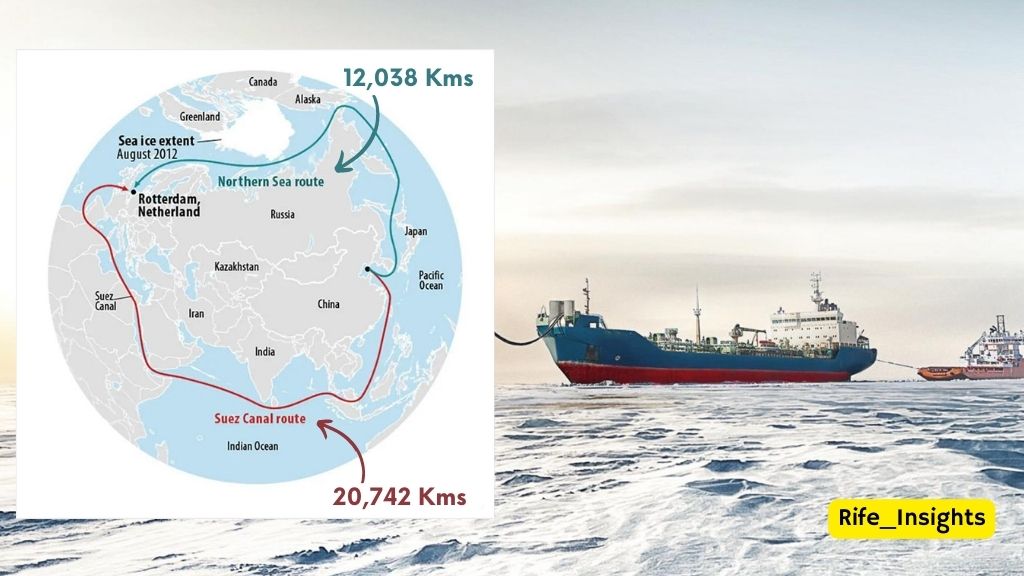Arctic Becomes New Pathway for Russian Oil Shipments to Asia

05 Aug 2023
Introduction
The Arctic region, once a frozen and inaccessible frontier, is rapidly transforming into a new pathway for Russian oil shipments to Asia. As the effects of climate change accelerate, the Arctic ice is melting at an alarming rate, opening up previously unnavigable waters and unlocking vast opportunities for trade and resource exploration. For Russia, this melting ice presents a strategic advantage, allowing it to tap into its rich oil reserves and establish shorter shipping routes to Asian markets. However, the increasing presence of Russian oil tankers in the Arctic also raises concerns over environmental risks and geopolitical implications.
The Melting Arctic: A New Trade Route for Russian Oil
Climate change has had a profound impact on the Arctic region, leading to a dramatic reduction in sea ice coverage. Consequently, the Northern Sea Route (NSR), which stretches along the Russian Arctic coast from the Kara Sea to the Bering Strait, is becoming increasingly navigable for longer periods each year. This has significantly shortened the traditional shipping route from Europe to Asia by thousands of miles, making it an appealing alternative for commercial vessels and, particularly, for Russian oil exports.
Russia’s Vast Oil Reserves and Asian Demand
Russia, being one of the world’s leading oil producers, possesses abundant reserves of hydrocarbons in the Arctic region. The ability to transport this oil more efficiently to Asian markets, especially to energy-hungry countries like China, Japan, and South Korea, offers a competitive advantage for Russia. By utilizing the NSR, Russian oil companies can reduce transportation time and costs, making their products more appealing in the competitive Asian energy market.
China’s Arctic Interest and Investment
China, the world’s largest energy consumer, is closely monitoring the developments in the Arctic. Recognizing the economic and strategic potential of the Northern Sea Route, China has shown growing interest in Arctic affairs. Chinese companies have made significant investments in Russian Arctic energy projects, forging partnerships that serve China’s energy needs while bolstering Russia’s Arctic ambitions. However, such cooperation raises concerns among other nations over the potential implications for regional dynamics and sovereignty.
Environmental and Ecological Risks
The melting Arctic ice also raises serious environmental concerns. The region is ecologically sensitive, home to unique species of wildlife and vital ecosystems. The increased shipping activity in these waters poses a risk of oil spills, maritime accidents, and pollution, which could have devastating consequences on the fragile Arctic environment. Addressing these risks requires international cooperation and stringent regulations to safeguard the Arctic’s ecological balance.
Also Read:
U.S. Contemplates Deploying Military Personnel on Merchant Ships in Strait of Hormuz
Geopolitical Implications and Tensions
As the Arctic ice continues to recede, there is a growing interest in the region from other nations, including the United States, Canada, and several European countries. The potential for resource exploration, shipping opportunities, and the establishment of new trade routes has fueled competition for influence in the Arctic. This has led to geopolitical tensions, with some nations expressing concern about Russia’s expanding military presence in the region and the possibility of territorial disputes.
The Legal Framework: UNCLOS and Territorial Claims
The United Nations Convention on the Law of the Sea (UNCLOS) provides the international legal framework for managing maritime spaces, including the Arctic. However, several Arctic countries, including Russia, have overlapping territorial claims, leading to complex negotiations over resource rights and the demarcation of maritime boundaries. Resolving these issues in a peaceful and cooperative manner is essential for ensuring stability and preventing potential conflicts.
Conclusion
The melting Arctic is transforming the dynamics of global trade and resource exploration, with Russia eyeing the region as a new pathway for its oil shipments to Asia. The Northern Sea Route presents significant economic opportunities for both Russia and Asian countries, particularly China. However, the increasing presence of Russian oil tankers in the Arctic raises environmental concerns and geopolitical tensions. It is crucial for the international community to collaborate and establish effective regulations to protect the Arctic’s delicate environment while ensuring peaceful cooperation among Arctic nations. As climate change continues to reshape the Arctic, responsible and sustainable management of this fragile region will be essential for the future of our planet and its geopolitics.
Click here to join our Telegram chanel
You will get information, news, and support related to Merchant Navy.
